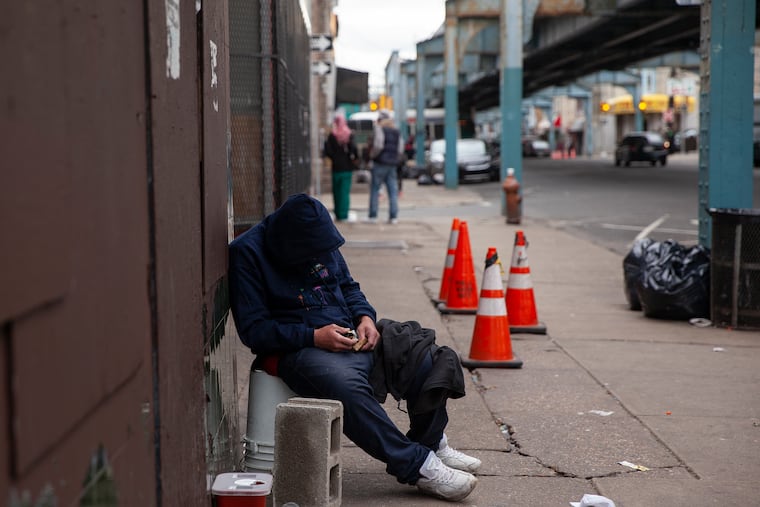Drug users risk overdoses when they’re alone. What does that mean during social distancing?
It's one more complication that the coronavirus pandemic has visited on healthcare workers who are trying to serve vulnerable populations.

One of the central tenets of harm reduction — measures that encourage people in addiction to use drugs as safely as possible, so they can remain alive until ready for treatment — is to avoid isolation.
People who use drugs alone, without a friend to monitor them, are at a much higher risk of fatally overdosing. It’s a risk that holds true even in an age of social distancing — just one more complication that the coronavirus pandemic has visited on health-care workers who are trying to serve vulnerable populations.
That includes the staff and the clients at Prevention Point Philadelphia, the Kensington public health organization that’s been forced to limit its services to avoid the spread of disease.
“All we can do is inform people of their risk of overdose, and potentially a heightened risk if they’re alone," said Silvana Mazzella, Prevention Point’s associate executive director. “To try to be more safe, we are getting people extra naloxone [the overdose reversal drug] to potentially use on others. We’re really trying to just ramp up people’s awareness of their risk and ways to be safe.”
In recent days, harm reduction organizations around the world have issued tip sheets for drug users on how to stay safe amid a global pandemic. A tip sheet released by the national Harm Reduction Coalition and Vital Strategies, the organization coordinating with the Bloomberg Foundation to reduce overdoses in Pennsylvania, advised people who are using drugs alone to avoid overdoses by stocking up on fentanyl testing strips and injecting drugs slowly to test their potency.
Those who use drugs with other people should have naloxone on hand and make plans to help each other in the event of an overdose, because emergency services might be strapped dealing with COVID-19 cases.
The coalition is also advising people who use drugs to avoid sharing syringes, cigarettes, pipes, and devices to snort drugs; to wash their hands after buying drugs and before preparing them; and to try to steer clear of such services as needle exchanges if they’re sick, instead asking for a delivery or for a friend to pick them up.
Mazzella said Prevention Point is working to educate clients about how to keep themselves safe.
“People are taking it surprisingly well,” she said. “We definitely saw a little bit less foot traffic around the building, and there are about 50 fewer people here for services. There are some people that are not aware and not too concerned; some of our older participants and more medically fragile participants are.”
At a table outside Prevention Point on Tuesday, volunteers conducted needle exchanges, then urged people to disperse.
“If you’ve got your works, you need to move down the street,” one worker said, though no one seemed to listen. People stood on the sidewalk and spilling into the street, smoking cigarettes and chatting in groups.
Antione James, 46, has been homeless and living on the street since he returned from prison in 2018. He spoke with a reporter after using the shower facilities at the Catholic Worker Free Clinic in Kensington.
James said he finds the nation’s response to the coronavirus “a little overzealous,” if confidence-inspiring.
Personally, though, he’s feeling at a loss, because he isn’t sure when he’ll be able to get back into Prevention Point.
”I was going there to see a counselor and a therapist, and now that’s been thrown off," he said. “I haven’t been there for two weeks, and I’m not sure when I’ll go back.”
About 15,000 people a year get services at Prevention Point, which deploys mobile syringe exchanges around the city and offers health care, medication-assisted treatment, and other services. Many of the center’s clients sleep outside and are in precarious health.
Amid the COVID-19 outbreak, the organization has halted some services that draw large crowds to the office, including the drop-in center, where people living rough can rest and get a meal inside.
Essential programs such as the syringe exchange, mail services, public bathrooms, addiction treatment, and treatment for HIV and hepatitis C will remain open, although the medication-assisted treatment program is not accepting new clients for the time being.
“We typically have 400 people coming in here, and being in extremely close quarters," Mazzella said. "We’re doing services from the door, and the mobile units. It was a hard decision to come by, but the reality is that [the staff] may be in the subset of people that don’t necessarily become symptomatic or sick, but could potentially make medically fragile people extremely sick.”
Mazzella said she was also worried about supplies for clients running low as the pandemic continues. The organization has stocked up on syringes, naloxone and other harm-reduction supplies. It’s also created an Amazon wish list and is asking for donations of nonperishable items and clothing, including underwear, socks, and undershirts, that will help clients on the street maintain better hygiene.
Prevention Point also runs two low-barrier shelters on Kensington Avenue, designed for people in addiction who may not be ready to stop using drugs, and is working to maintain good stores of supplies for those residents.
So far, the response from supporters has been encouraging, Mazzella said: “The wish list just went up on the weekend, and we got almost an entire room full of donations.”